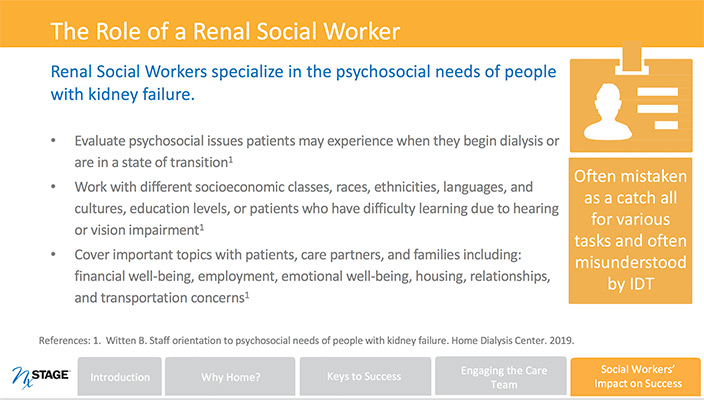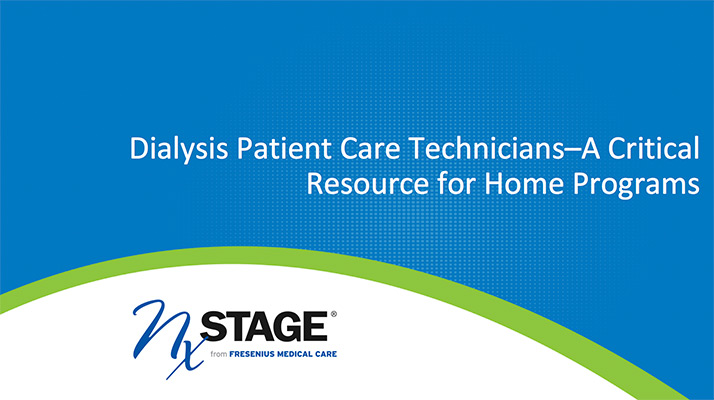Area of Focus 3
ENSURE PARTICIPATION OF THE INTERDISCIPLINARY TEAM Detailed Results
It is not uncommon to hear about companies and facilities who struggle with engagement, especially those working in a Home Dialysis Training Program. For many, home programs are often thought to be the sole responsibility of the home training nurse. However, in the NNI article, Strategies to Optimize Patient Retention in Home Hemodialysis, it showed the most successful home teams are those that engage the entire interdisciplinary staff and integrate Social Workers, Dietitians, and Patient Care Technicians into the Home Program as frequently as possible. Many of these teams have also moved to have dedicated Social Workers and Patient Care Technicians as part of the Home Program staff.
Each of these special disciplines, like Social Workers and Patient Care Technicians can focus on supporting patients and are able to perform many of the roles currently being fulfilled by the Home Training Nurse. This reallocation of staff helps keep the Training Nurses focused on training and patient clinical management, and allows other members of the team to help with things like home visits, education reinforcement, and equipment swaps.
To help get your team engaged and energized about home therapies, consider expanding their exposure to the home program through some suggested activities.
Staff Meetings/Team Huddles/Open House
Meeting with the larger staff will allow you to share your knowledge about the therapy and share some important success stories.
- Consider establishing formal interactions with center staff to discuss home therapies
- Provide quick bits of information, brochures, or other educational materials to entice curiosity
- Consider inviting MDs, facility staff, patients, fellows from local university, surgeons to stop by the home program to see the equipment on display and encourage a patient advocate to speak about home.
Below are a series of webinars and resources that help explain the importance of team engagement and give you practical steps you can take now.
The reported benefits of home hemodialysis (HHD) may not be experienced by all patients.
The NxStage System is a prescription device and, like all medical devices, involves some risks. The risks associated with hemodialysis treatments in any environment include, but are not limited to, high blood pressure, fluid overload, low blood pressure, heart-related issues, and vascular access complications. When vascular access is exposed to more frequent use, infection of the site, and other access related complications may also be potential risks. The medical devices used in hemodialysis therapies may add additional risks including air entering the bloodstream, and blood loss due to clotting or accidental disconnection of the blood tubing set.
Home hemodialysis with the NxStage System during waking hours may not require a care partner, provided a physician and a qualified patient agree that solo home hemodialysis is appropriate. Patients performing nocturnal treatments are required to have a care partner. Care partners are trained on proper operation and how to get medical or technical help if needed.
Certain risks associated with hemodialysis treatment are increased when performing solo HHD because no one is present to help the patient respond to health emergencies. If patients experience needles coming out, blood loss, or very low blood pressure during solo HHD, they may lose consciousness or become physically unable to correct the health emergency. Losing consciousness or otherwise becoming impaired during any health emergency while alone could result in significant injury or death. Additional ancillary devices and training are required when performing solo HHD
Certain risks associated with hemodialysis treatment are increased when performing nocturnal therapy due to the length of treatment time and because therapy is performed while the patient and care partner are sleeping. These risks include, but are not limited to, blood access disconnects and blood loss during sleep, blood clotting due to slower blood flow and/or increased treatment time, and delayed response to alarms when waking from sleep.
Patients should consult their doctor to understand the risks and responsibilities of performing these therapies using the NxStage System.




